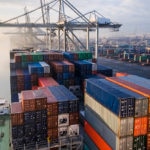Trade and international investment: the keys to economic progress
Mexico´s medium —and long— term perspectives are favorable, given the possibility of an improved NAFTA (North American Free Trade Agreement) and recent, profound structural reforms that are beginning to bear fruit.

That was one of the principal ideas that Adolfo Albo Márquez, chief of staff of the president of BBVA Bancomer, put forth in his presentation during the panel on “The International Outlook for Trade and Investment,” held July 21 during the “IV Encounter: Multilatina companies and their impact on the development of Iberoamerican integration.”
At the event, which was organized by the Menéndez Pelayo International University in Santander, business leaders and government officials from Iberoamerica met to evaluate the global trends in trade integration, governance, the role of digital media and international investments.
The event featured speakers such as former Uruguayan President Julio María Sanguinetti, Enrique Iglesias, the former secretary general of the Iberoamerican general secretariat; Román Escolano, vice-president of the European Investment Bank and Luis Carranza, president of the Andean Development Corporation.
Adolfo Albo Márquez centered his presentation on explaining how trade and international investment are essential to economic progress. He cited the example of NAFTA (the North American Free Trade Agreement), but noted that, moving forward, it will be necessary to build a new development model that leads to more inclusive growth. He pointed out that in the last three decades, the world has changed radically. On the one hand, the revolution in information technology has created new sources of competition for traditional economic sectors such as hotels and taxis, which today confront companies such as Airbnb and Uber.
On the other hand, production processes and trade in the world have also changed significantly. “When NAFTA was signed nearly 25 years ago, we were living in a world with fragmented production processes and an international trade focused on the export of final products. Today, things are very different; production processes are increasingly integrated into global value chains and more than 50% of trade consists of inputs and is intraregional,” Albo Márquez said. “The technological transformation has meant that, for example, 87% of job losses in the United States are due to disruptive technologies and not to international trade. On the contrary, international trade has contributed to companies’ productivity and to net job creation.”
According to Albo, if one considers the North American region as a whole, NAFTA’s development of trade and investment has brought ample benefits to its three partners. Regional trade and Foreign Direct Investment (FDI), have risen by 190% and 318%, respectively, which has driven up productivity in North America by 43%. This has contributed to an 82% rise in the region´s GDP, generated more than 53 million jobs and increased per capita income by 37%.
As for the current renegotiation of NAFTA, Albo Márquez expressed his confidence that in spite of the uncertainty and the multiple scenarios that could arise, due to the rhetoric of the Trump administration, the economic interests of the three countries clearly are in favor of an improved NAFTA that will strengthen their overall productive processes and consolidate their competitivity in the world.
“The current renegotiation of NAFTA also implies a learning process in which the private sector and civil society can take a major role, in order to have a greater participation in the negotiation of the accords, the design of public policy and the electoral processes, in order to restrain populism.”
Adolfo concluded by saying that “at BBVA Bancomer we are optimistic about the renegotiation of NAFTA. As for the content, we will have a better agreement, although the negotiation process may be complicated, even uncertain at times, and this can lead to delays; the benefits of free trade and investment will take dominate over temporary distractions.”
Adolfo Albo Márquez took part in the panel on “The International Outlook for Trade and Investment,” along with Román Escolano, ambassador of Peru in Spain; Carlos López Blanco, director of Public Affairs and Regulation at Telefónica; Carlos Malamud, principal researcher for Latin America at the Real Instituto Elcano; and Elena Nieto, chief economist for Latin America at Cemex. The panel was moderated by Jaime Folguera, a partner at the Uría Menéndez law firm.